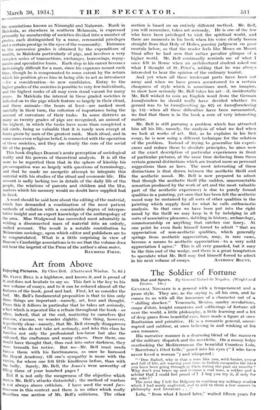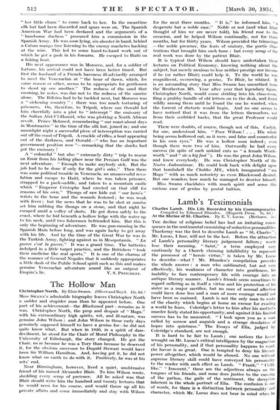The Soldier of Fortune
Silk Hat and Spurs. By General Rafael do Nogales. (Wright and Brown. 18s.) GENERAL NOGALES is a general with a temperament and a prose style. They are, as the saying is, all his own, and he comes to us with all the innocence of a character out of a " shilling shocker." Venezuela, Mexico, sundry revolutions, coups d'itats, knight errantries and soldierings of fortune all over the world, a little philosophy, a little learning and a lot of deep gazes from beautiful eyes, have made a figure at once Ruritanian and primitive. He is a romantic general, uncor- rupted and sublime, at once believing in and winking at his
own romance.
His narrative manner is a disarming blend of the manners of the military dispatch and the novelette. On a mossy ledge overlooking the Mediterranean the beautiful Countess Lola, " Barcelona's feted belle," gazed into his eyes (" I who have never loved a woman ") and whispered :
"'Don Rafael, why is that a man like you, with brains, young and full of life, art wasting your time in foolish escapades the likes you have been going through in Paris during the past aix months ? Why don't you brace np and become a real man, a soldier and a scholar that I could feel proud of ? I beg you try it, if only for my sake I' The next day I left for Belgium to continue my military studies which I had sorely neglected, and to add to them a few courses in philosophy and literature . . ."
Lola, " from what I heard later," waited fifteen years for
" her little churn " to come back to her. In the meantime silk hat had been discarded and spurs were on. The Spanish American War had been declared and the arguments of a " handsome duchess " procured him a commission in the Spanish Army. He was soon lying, six-shooter in hand, behind a Cuban mango tree listening to the enemy machetes hacking at the wire. This led to some hand-to-hand work out of which he got a gash in his forearm. He escaped to Haiti on a fishing boat.
• His next appearance was in Morocco, and, for a soldier of fortune, his arrival could not have been better timed. But first the husband of a French baroness ill-advisedly arranged to meet the Venezuelan at " the hour of dawn, which, for sonic reason or other, seems to be appropriate for gentlemen to shoot up one another." The redness of the sand that morning, he notes, was due not to the redness of the sunrise alone. The Bifefios had to be tackled next, but Morocco was a " sickening country " : there was too much torturing of prisoners. On, therefore, to Tripoli, where one Oswald led him cheerfully into a plot to " intercept " the emissary of the Sultan Abd-U1-Harnid, who was plotting a North African revolt. Prince Mehmed, remembering " our roust-about days in Montmartre" in the time of the silk hat, joined in; and one moonlight night a successful piece of interception was carried out off the coast of Tripoli. A crackle of rifles, a boat appearing out of the darkness, and • Oswald—" who has an important government position now "—remarking that the sharks had got the emissary !
A " colourful " but also " extremely dirty " trip to rescue an Emir from his hiding place near the Persian Gulf was the next adventure. " Enough to make anybody sick. But the job had to be done if only for the girl's sake." Then there was some political trouble in Venezuela, an unsuccessful revo- lution and escape to Haiti, where he was taken prisoner, strapped to a pack-saddle, and taken to a mountain castle which " Emperor Cristophe had erected on that cliff for reasons of his own." Thongs of raw hide cut " our hero's " wrists to the bone and the wounds festered ; he was weak with fever ; but the news that he was to be shot at sunrise set him rubbing the thongs on a stone, and that night he escaped amid a volley of shots. He got down safely to the Coast, where he hid beneath a hollow ledge with the water up to his neck, until two fishermen befriended him. But this is only the beginning of adventure. He was gun-running in the Spanish Main before long, and was again lucky to get away with his life. And by the time of the Great War he was in the Turkish Army, fighting against us in Mesopotamia. " La guerre c'est la guerre." It was a grand time. The batteries indulged in a little target practice, and the Britishers " took their medicine like real sports." It is one of the charms of the manner of General Nogales that it suddenly appropriates a little dash of the Public S3hool spirit such as this and makes genuine Venezuelan adventure sound like an outpost of









































 Previous page
Previous page